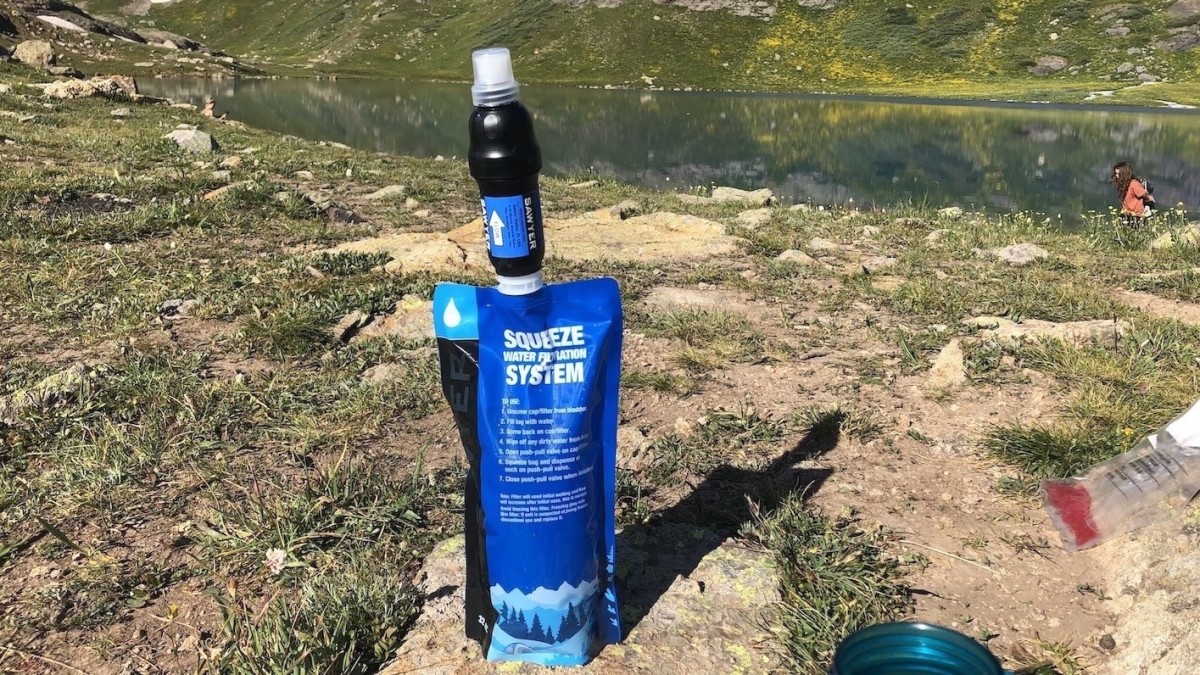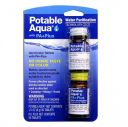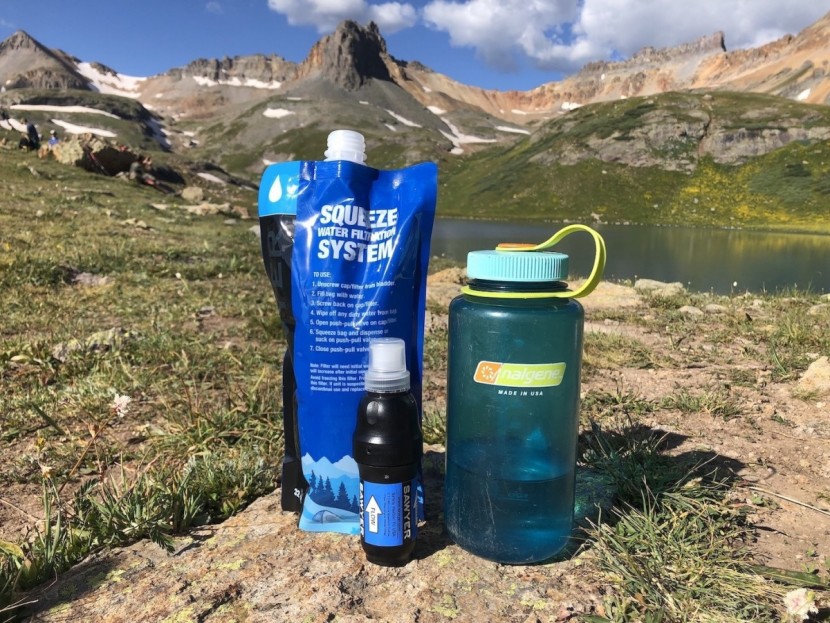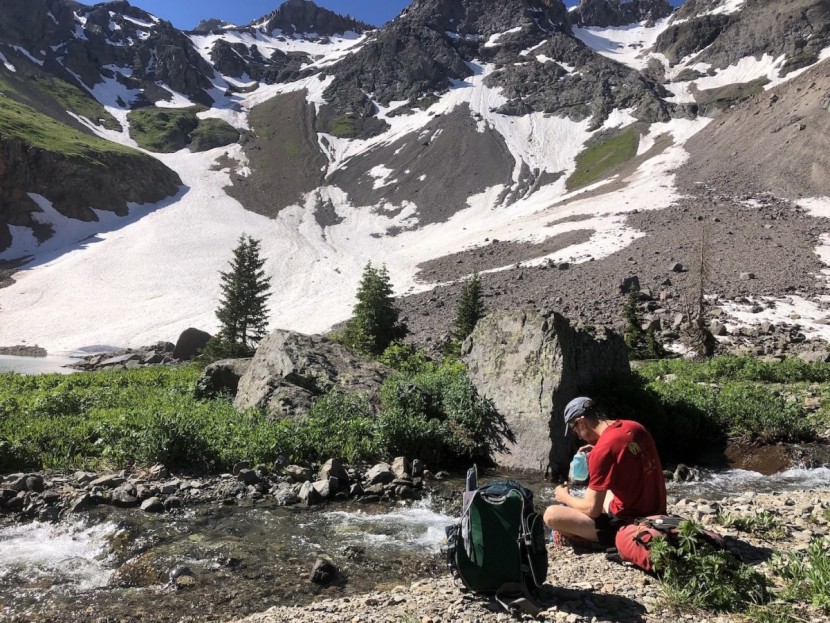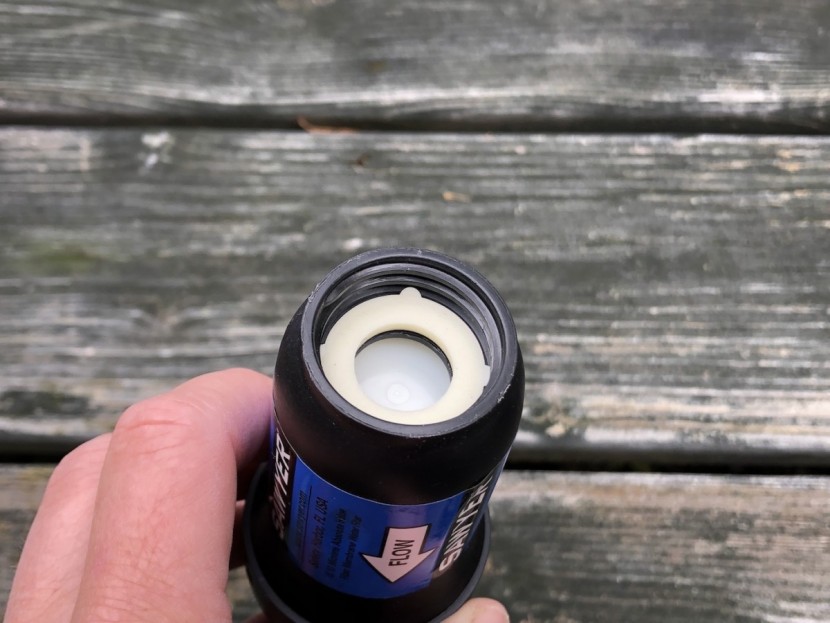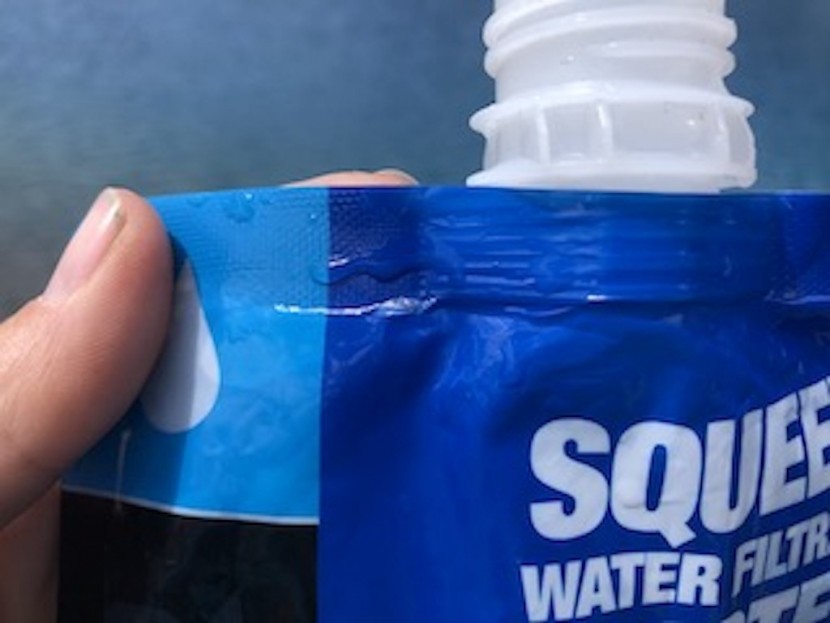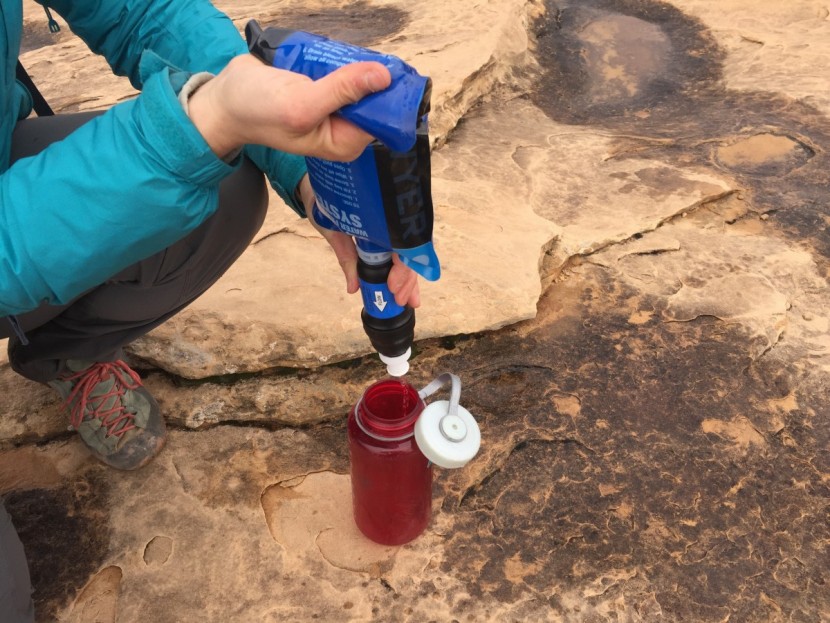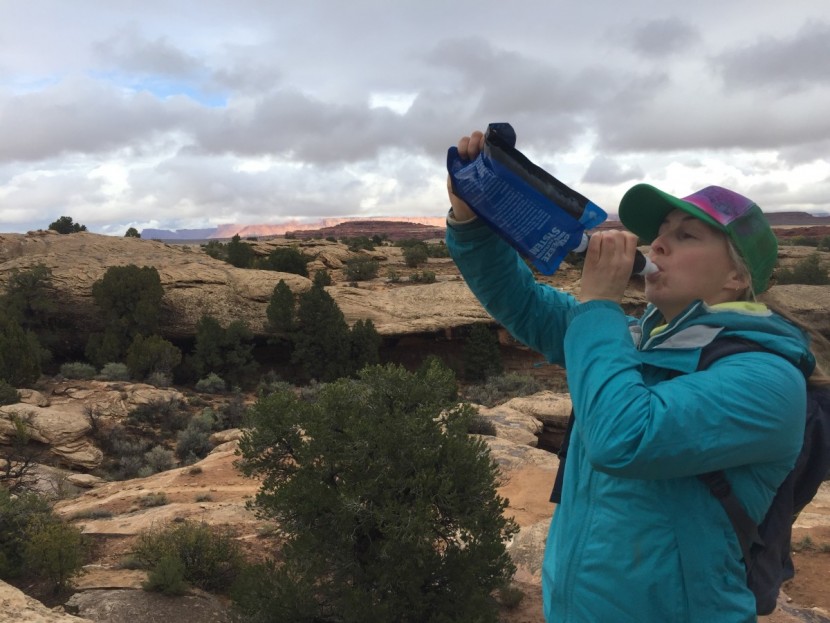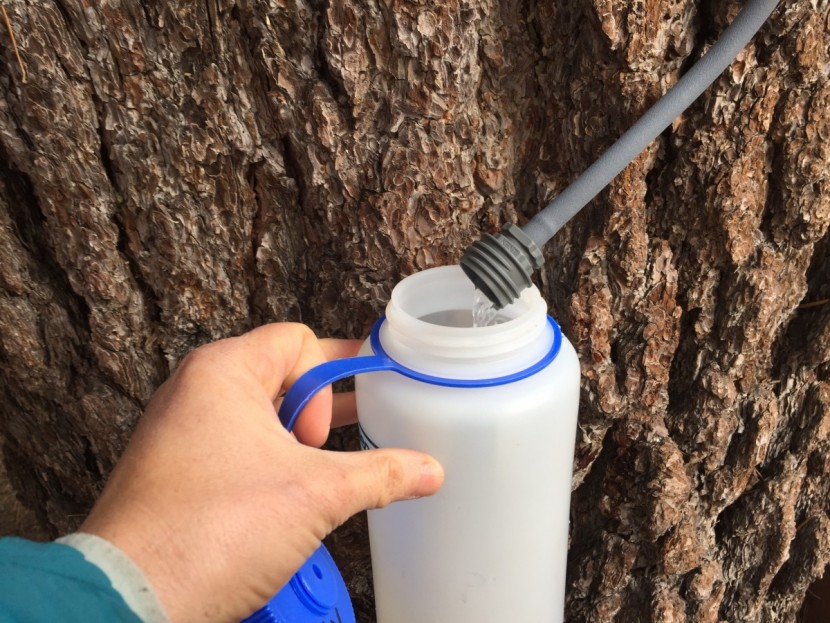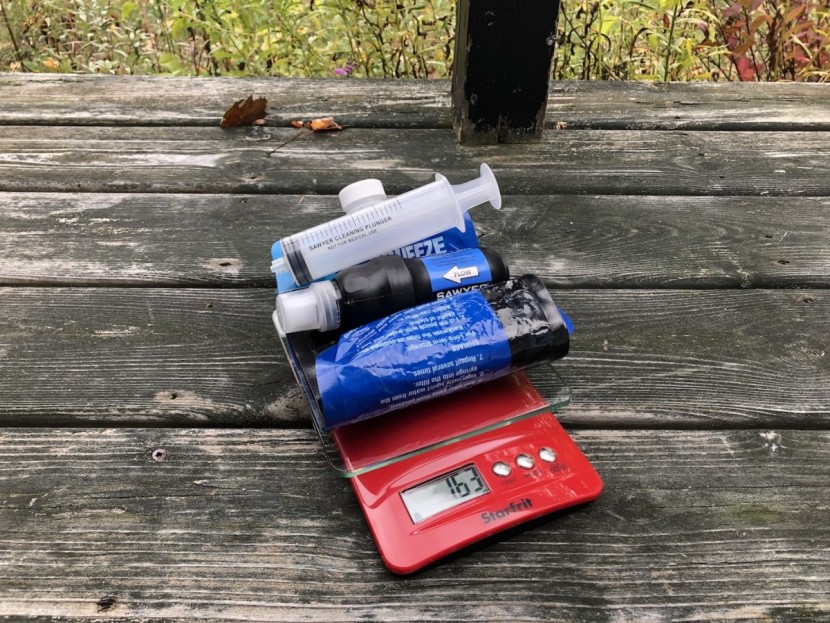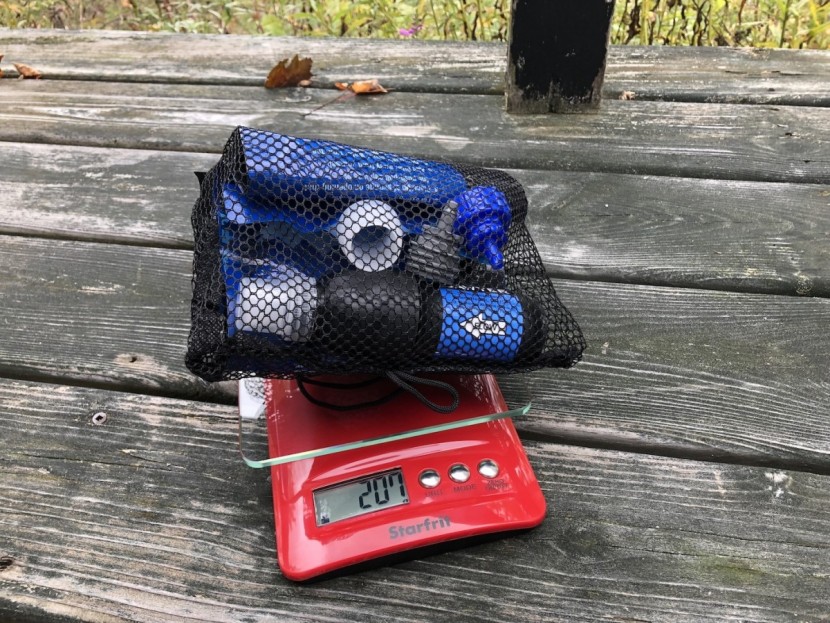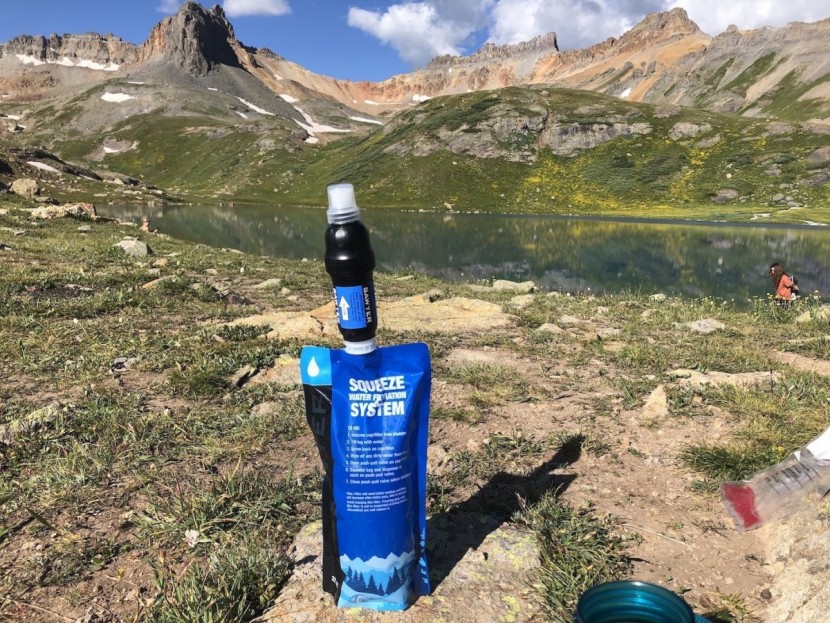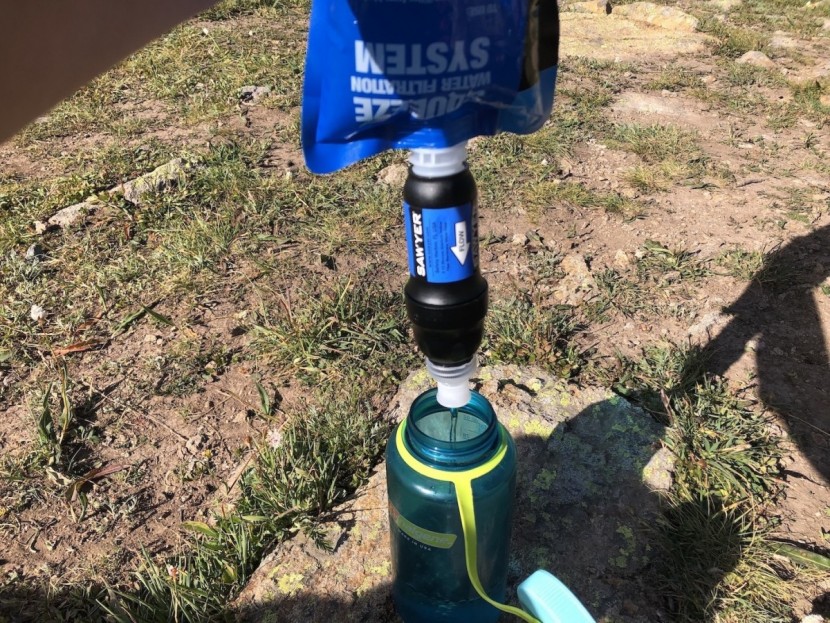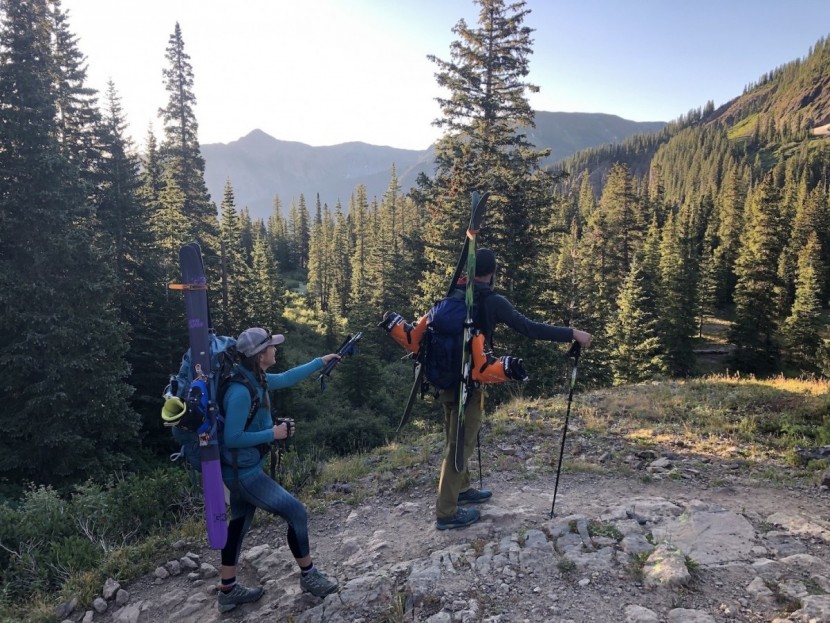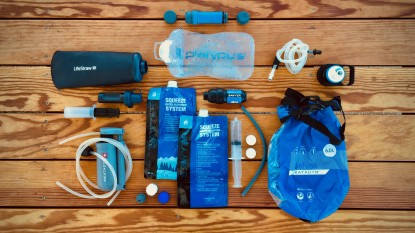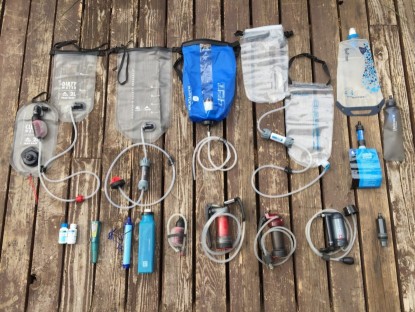Our Verdict
Compare to Similar Products
 This Product
Sawyer Squeeze | |||||
|---|---|---|---|---|---|
| Awards | Best Overall Filter for Personal Use | Best Collapsible Bottle Filter | Best Bang for the Buck | ||
| Price | $38.17 at Amazon Compare at 2 sellers | $43.95 at REI Compare at 2 sellers | $55.00 at REI Compare at 3 sellers | $12.96 at Amazon Compare at 2 sellers | $7.99 at Amazon Compare at 2 sellers |
Overall Score  |
|||||
| Star Rating | |||||
| Bottom Line | This lifetime guaranteed product is easy to use on the trail | A solid option for personal filtration usage during fast and light backcountry missions | Our favorite collapsible soft bottle filter, thanks to a durable design that's consistent and easy to use | The best chemical treatment option that will kill all pathogens when given enough time | Lightweight and easy to use, these tablets can be used as an emergency backup to regular treatment |
| Rating Categories | Sawyer Squeeze | LifeStraw Peak Squeeze | Hydrapak Flux 1.5L | Aquamira Water Trea... | Potable Aqua Purifi... |
| Water Quality (20%) | |||||
| Durability & Maintenance (20%) | |||||
| Treatment Time (15%) | |||||
| Weight & Packability (15%) | |||||
| Ease of Set Up (15%) | |||||
| Ease of Filtration (15%) | |||||
| Specifications | Sawyer Squeeze | LifeStraw Peak Squeeze | Hydrapak Flux 1.5L | Aquamira Water Trea... | Potable Aqua Purifi... |
| Measured Weight (entire kit) | 5.7 oz | 3.8 oz | 5.0 oz | 3.0 oz | 2.3 oz |
| Removes Particulates (sediment, microplastics) | Yes | Yes | Yes | No | No |
| Effective Against Viruses | No | No | No | Yes | Yes |
| Effective Against Chemicals | No | No | No | No | No |
| Effective Against Heavy Metals | No | No | No | No | No |
| Effective Against Bacteria | Yes | Yes | Yes | Yes | Yes |
| Effective Against Protozoa (Giardia, Cryptosporidium) | Yes | Yes | Yes | Yes | Yes (Giardia = yes; Crypto = no) |
| Type of Filter/Purifier | Squeeze, in-line, on-the-go | Squeeze | Squeeze, in-line, on-the-go | Chemical treatment | Chemical treatment |
| Filter Media or Active Ingredient | Hollow fiber | Hollow-core membrane microfilter | Hollow fiber | Chlorine dioxide | Iodine and Tetraglycine Hydroperiodide |
| Filter Pore Size (Advertised) | 0.1 microns | 0.2 microns | 0.2 micron | N/A | N/A |
| Number of Liters/Gallons per Lifetime (Advertised) | 378,541 L / 100,000 gal | 2,000 L / 500 gal | 1,500 L / 396 gal | 114 L / 30 gal (per package) | 25 L / 6.6 gal |
Our Analysis and Test Results
The Squeeze is known for its versatility, reliability, and excellent flow rate. While it doesn't protect from heavy metals or viruses, it'll keep you safe on trips into the backcountry throughout the U.S. and Canada. Its lightweight nature and packability make it perfect for long, light backpacking trips. It takes questionable and smelly water and transforms it into delicious and refreshing hydration. Take it with you on your next trip, either as a backup emergency system for large groups or as your personal carry system. Just bring another bottle to filter into, as the bags are subject to durability flaws.
Water Quality
Are you scared of contracting beaver fever? Have no fear; the Squeeze will keep you clear. This tiny filtration system is loaded with a certified 0.1-micron absolute filtration system that can eliminate bacteria, E. coli, protozoa, and cysts from your drinking water. When used properly, the Squeeze should be sufficient in water sources throughout North America.
We did the majority of our testing on this filter while running and hiking in Colorado, Northern Ontario, and the High Sierra. Both are areas where we don't have to worry about contracting viruses in the water. After over 50 miles of foot travel in these environments, we were kept hydrated and healthy, even when taking water from questionable, turbid, and flowing water sources.
This filtration system is ideal for this continent since waterborne viruses are not a problem in North America. However, it is not a purification system, so it can't remove heavy metals or waterborne viruses, which might be problematic in countries where water quality is not regulated. So, if you are traveling internationally or somewhere you know viruses and heavy metal contamination might be a problem, we can't recommend this system.
It's grand for everything else. It removes microplastics and works well for camping, hiking, backpacking, trail running, and other trips around the United States or Canada. Using the Squeeze improves water quality, turning dirty, contaminated, smelly water into pristine, drinkable water that tastes good.
Durability and Maintenance
Reliability is critical when considering your chosen system will be your only means of water filtration once you're deep in the backcountry. And, after all, clean water keeps you healthy enough to truly explore the outdoors. The Squeeze is a system with a few flaws, but when managed properly, it can provide the reliability needed in the long run. We love that one filter is projected to filter 3,780,000 gallons of water.
But first, the bad news. The filter itself is constructed of a durable composite that'll easily hold up to falls and drops, but it has many pieces to the system that need to be carried with it. Aside from this small hassle, the primary durability flaw many online users have complained about is that the O-ring on the filter does not seal correctly after a few weeks on thru-trails. The kit comes with an extra O-ring, and while we didn't personally experience this problem, we'd recommend carrying the backup provided in case this happens to you.
The second durability issue we experienced several times while using the kit is breaking the squeeze bags. This design flaw should have been considered, given how the system works. The squeeze bags are used to collect water, then screw onto the Squeeze filter. You firmly squeeze the bags, pushing the collected dirty water through the filter to flow into your hydration bladder or water bottle. We like using this system in this way because the flow rate while drinking isn't compromised, but the bags weren't always strong enough to withstand the pressure needed to squeeze the water through the filter. Alternatively, you can carry the squeeze bag filled with dirty water and drink right through the filter. In either case, be aware of the bags breaking.
The bags are made of plastic that is relatively impervious to punctures and can be thrown around in a backpack, but their Achilles heel is the welded seams. In most cases, when we experienced a bag break, we were squeezing hard, so don't be surprised if this happens when you're trying to rush the filtration process. We have still trusted this system for long thru-hikes, but make sure to bring a few extra bags. Another GREAT alternative is to carry a classic disposable plastic water bottle with you. These bottles are compatible with the threads of the Squeeze filtration system and provide a much more durable “squeeze” bag option.
Those are the durability issues. Maintenance is another consideration to take into account. This system comes with a syringe to push dirty water back through the system, also known as a backflush. If you are traveling in areas with silty or heavily contaminated water, the filter's flow rate will be compromised after a few uses. The syringe needs to be carried (with all its component parts) so that you can backflush the system each time you use it. This doesn't take long; simply load it onto the end and push air through the system to clean it up. Voila… an easy-to-maintain system. Despite our previous comments, we think this is the most durable and easiest to maintain out of all the Sawyer systems out there. While it seems like a lot, maintenance and durability issues are super easy to mitigate, especially when you know the failure points before buying this product. All filters require at least some maintenance and care.
Treatment Time
Treatment time varies depending on how you use the Squeeze. There are a couple of different ways to collect and filter water, which adds to the versatility of this system. Of all the Sawyer products we've tested, including the Micro and the Mini, treatment time and the flow rate are better and, quite frankly, pretty impressive for this type of system.
The first and most popular way to treat water is by collecting it in the provided bags and squeezing it through the filter into another water bottle. In this form of filtration, we measured the flow rate by filling up one of the provided bags and squeezing one liter of water through the filter. After averaging three separate tests, we found that this larger system filters one liter of water in approximately 40 seconds. This is relatively fast compared to the time it takes the smaller Sawyer products and other hand pumps. As a result, treatment time in Squeeze mode is pretty awesome. Easy and fast for on-trail practicality.
Another way to filter water is through direct consumption. Yep, that's right. You can use the pouch or a regular water bottle to collect the water, screw the filter onto the pouch and drink right through it. Another option is to use the straw. Attach it to the bottom of the filter with the blue attachment cap, and then drink the water through the straw. While the flow rate isn't as fast as drinking without a filter on your bottle, this provides immediate water filtration. Either way, the Squeeze offers a decent treatment time that makes it easy to filter water, especially if the time to treat is important to you.
Weight and Packability
This system is quite packable for backpacking and hiking adventures. We used it as a backup group filter while backpacking three days into the Gunnison Gorge in Colorado. It doesn't weigh much, and all the components can easily fit into the nooks and crannies of your backpack.
There is a certain amount of freedom in choosing which parts you bring with you on your adventures. The Squeeze comes equipped with a mesh bag, filter, extra O-ring, a syringe for backflushing, a straw, straw adapter, and a few extra bags. On a regular backpacking trip, we'd recommend bringing all the parts, including the extras. You can omit the straw if you know you won't use it, but all parts of the system are about the size of a big salami sandwich when loaded into the mesh bag. Given the durability issues of the bags, we'd recommend bringing a plastic water bottle and a bag or two on longer adventures. Altogether, this weighs about 5.7 oz.
The filter itself is bigger than the other Sawyer filters tested, but it still fits nicely into any pack, whether it's a running vest or a backpacking bag. We typically stored it in the pack's lid to ensure we had easy access on longer trips. After a few weeks of use, we concluded that it is a lightweight and packable system designed for all types of recreation. Hiking, fishing, and backpacking are just a few activities where we could see this system coming in handy.
Ease of Set Up
Setting up this filter is relatively easy. If you're looking for immediate filtration, attach the straw and suck up the water from your source of choice. Alternatively, fill up your bag, attach the filter, and squeeze it into your drinking vessel of choice.
Water access for this system requires you to be close to the source. Unlike a hand pump where you can stick a hose into the water from a high bank, you need to either get your face close to the source for immediate filtration or put the bag of water into the source for collection.
We found that flowing water sources are the easiest to collect from, followed by lakes and ponds. Shallow, non-flowing sources are a little difficult to collect from using the bag system as you need to be able to scoop it up from the source. In this case, you could use the straw to sip at it if needed.
Overall, the setup is pretty straightforward. Setting up for both squeeze and immediate filtration typically took about thirty seconds. We view this system as simple and easy to use.
Ease of Filtration
The filtration rate on the trail is pretty amazing. Simply set up your system by collecting water, then squeeze it through the filter. The filtration process takes a little patience and a firm grip when using the bag system. Other than that, it's pretty darn easy.
This filtration system has a large surface area that enables a consistent and fast flow, making getting water easy. Drinking right through it provides a sufficient drink in just seconds. During our squeeze filtration tests, it only took about 40 seconds to filter one liter of water, which is significantly faster than other Sawyer products that are smaller without the advantage of a higher surface area.
When filtering, it's important to find a place with level ground to put your vessel so it doesn't tip over. When the terrain is uneven, we put a bottle between our knees. Filtration is easy and doesn't require too much effort, especially when you're drinking right from the filter itself.
Should You Buy the Sawyer Squeeze?
This system has many components, including three different squeeze bags, adaptors for in-line filtration to hydration bladders, a straw, backup parts, and a syringe. Sawyer projects this filter to last for 3,780,000 gallons of water filtered, which is a pretty incredible value overall. While the filter is durable, the bags that come with the purchase are susceptible to breaking. While the Sawyer Squeeze is a solid personal water filtration system, better options exist with more durable bags and a simplified design. This filter is reliable, and the total system is affordable, so long as you don't mind replacing the bags.
What Other Backpacking Water Filters Should You Consider?
The Sawyer Squeeze filtration system offers versatility for many adventures, being relatively lightweight, packable, and easy to use. You can pair it with a hydration bladder or drink straight from the source. While the integrated squeeze pouches don't inspire much confidence, the filter itself is reliable, making it a solid option for backcountry travel, day hikes, and everything in between. Another more modern and superior personal squeeze filter that has gained momentum amongst backcountry users is the LifeStraw Peak Squeeze. The Peak Squeeze simplifies the collapsible bottle design with a much thicker, more durable bottle at a similar price. Or, if you don't mind replacing the bag provided by the manufacturer, the Katadyn BeFree 0.6L is also popular amongst thru-hikers and backcountry travelers. But when durability is of top importance, we recommend the Hydrapak Flux 1.5L for its thicker, sturdier design, complete with user-friendly twist top and cover for simple on-the-go use.


